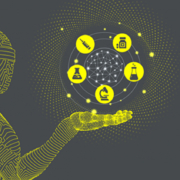The marriage between quantum computing and AI promises to be the next big thing in IT, probably no more so than how it will impact and advance AI applications for healthcare.
AI is already being used in many areas of healthcare, from analyzing medical images to developing personalized treatment plans for patients. While quantum computing is still in its infancy, it has the potential to solve complex problems much faster than classical computers. When these two technologies are combined as is beginning to be realized, the possibilities are endless, particularly in healthcare delivery and drug research.
The revolution is already beginning. For example, Moderna and IBM recently announced a partnership that will explore various use cases of quantum computing within the life sciences, particularly mRNA medicine design.
As part of the collaboration, both organizations will employ MoLFormer, an AI-based foundation model, to predict the properties of molecules and gain insights into the characteristics of potential mRNA medicines.
What Makes Quantum Computers So Special?
Quantum computing operates by substituting classical computing’s bits with quantum bits, commonly referred to as “qubits.” Unlike bits, which can only store binary values of 0 or 1, qubits can exist as a superposition of both 0 and 1 simultaneously. This is made possible through a phenomenon in quantum mechanics called entanglement. This gives them computing power vastly superior to even today’s fastest supercomputers. Quantum computers’ ability to process vast amounts of data very quickly and very intuitively makes them particularly useful for advanced AI algorithms, particularly the kinds that are used in healthcare diagnostics and medical research where analyzing vast amounts of data for often minute details are required.
Let’s drill down on what quantum computing and AI when combined, can mean for healthcare delivery and for drug discovery.
Healthcare Delivery
Quantum computing can be used to process large amounts of data from medical records, electronic health records, and other sources to provide personalized healthcare services. The use of AI and quantum computing in healthcare delivery can also help in developing predictive models that can forecast the likelihood of certain diseases or health conditions. This information can help healthcare providers take proactive measures to prevent or treat diseases early, thus reducing the overall cost of healthcare and improving patient outcomes.
Additionally, AI can be used to develop chatbots that can provide immediate responses to patients’ queries and concerns. Chatbots can help reduce the workload on healthcare providers and provide quick and efficient responses to patients’ questions, thus improving patient satisfaction and overall healthcare experience.
Drug Research
As evidenced by the announced partnership between Moderna and IBM, drug discovery and pharmaceutical research is where quantum computing and AI is posed to make their most significant leap.
The development of new drugs is a complex and time-consuming process that can take years or even decades to complete. However, the combination of AI and quantum computing can significantly speed up this process. Quantum computing can be used to simulate chemical reactions and predict the properties of new molecules, making it possible to identify promising drug candidates faster.
AI can then be used to analyze the vast amounts of data generated by quantum computing simulations to identify the most promising drug candidates for further testing. This approach can significantly reduce the time and cost of drug development and bring new treatments to market that much faster.
The combination of AI and quantum computing has the potential to revolutionize healthcare delivery and drug research. It can help healthcare providers deliver personalized healthcare services, develop predictive models, and improve patient outcomes. It can also significantly speed up the drug development process and bring new treatments to the market much faster. While there are challenges that need to be addressed, the possibilities are endless, and the future of healthcare looks promising with the integration of these two technologies.
How Big Rio Can Help
Quantum computing is still very much an emerging technology with large-scale and practical applications still a way off. However, the technology is steadily graduating from the lab and heading for the marketplace. In 2019, Google announced that it had achieved “quantum supremacy.”
Much like the partnership between Moderna and IBM BigRio has partnered with our sister company, Citadel Discovery, to use AI to advance drug discovery. Citadel was launched in 2021 with the purpose of giving a kind of “open access” to the data and technology that will drive the future of pharma research streamlining and lowering the costs of drug discovery and biological research.
The costs of drug discovery continue to rise, with current estimates exceeding $2 Billion. Not to mention that bringing a drug successfully through all clinical trial phases takes, on average, 10-12 years in research and development. Artificial intelligence and machine learning in drug discovery hold the key to reducing these costs and timelines.
You can read much more about how AI is redefining drug discovery in my new book Quantum Care: A Deep Dive into AI for Health Delivery and Research. It’s a comprehensive look at how AI and machine learning are being used to improve healthcare delivery at every touchpoint, with a particular emphasis on drug discovery and Pharma research.
Rohit Mahajan is a Managing Partner with BigRio. He has particular expertise in the development and design of innovative solutions for clients in Healthcare, Financial Services, Retail, Automotive, Manufacturing, and other industry segments.
BigRio is a technology consulting firm empowering data to drive innovation and advanced AI. We specialize in cutting-edge Big Data, Machine Learning, and Custom Software strategy, analysis, architecture, and implementation solutions. If you would like to benefit from our expertise in these areas or if you have further questions on the content of this article, please do not hesitate to contact us.









